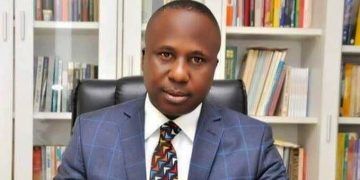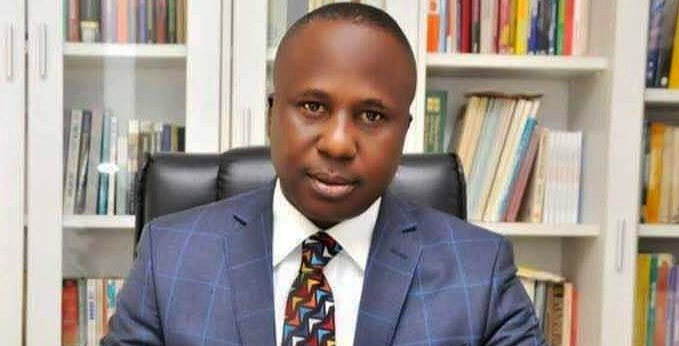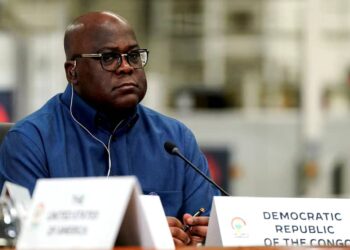Speech Delivered By Prof. Steve. S. Azaiki While Inaugurating The Board Of Directors Of The Nigerian Chapter Of The Parliamentary Network On The World Bank And The International Monetary Fund On The 5th Of April 2023
I want to welcome you all to this meeting for the inauguration of the Board of Directors of the Nigerian chapter of the Parliamentary Network on the World Bank and the International Monetary Fund and to thank you for the interest you have shown in the objectives and the activities of the Network.
This is the second time we are having a meeting of the Network. The first meeting was held in December 2023 shortly after I had been elected as Vice Chair of the Board of the Network and we had in attendance members of the National Assembly who have demonstrated a willingness to participate in the activities of the Network. The meeting we are having today is for the formal inauguration of an interim Board of Directors of the Nigerian chapter of the Network, which will oversee the transition between the current 9th National Assembly and the 10th National Assembly.
Considering the vital role of the World Bank and the IMF in global affairs, especially as regards proffering solutions to development challenges, financing development projects, embarking on poverty alleviation programmes, and adopting other strategies for improving the standard of life for the peoples of the world, it is easy to see how important it is for legislators to keep abreast of happenings within the World Bank and the IMF and dialogue with these institutions on matters that affect their constituents.
The Parliamentary Network was established to create a forum for discussion among legislators and these very important international financial and development institutions. It is therefore necessary for members of legislative bodies, which are saddled with the responsibility of elevating the standard of living of their constituents through lawmaking processes, to interact with these institutions that are devoted to tackling the obstacles to a brighter life for people in all corners of the globe. I believe this interaction will strengthen our capacity to serve our various constituencies.
I have been to several meetings of the Network and I have seen some African countries attend with a sizable delegation. It is surprising that Nigerian legislators are barely aware of the existence and activities of the Network. Yet we can play crucial roles in the affairs of the Network and take advantage of the opportunities it offers.
Getting to be conversant with the operations of the World Bank and the IMF will make it easier for our Parliament to take more informed decisions when our country is relating with these institutions with respect to their policy prescriptions, developmental agendas, options for financing projects, or dealing with some of the challenges facing mankind, especially climate change.
Networking and interacting with members of the Network from other countries will facilitate comparing of notes and sharing of best practices, which will strengthen our effectiveness for using the lawmaking process as an instrument of social engineering. Through this Network, we can enrich our minds, expand our horizon, and become better at delivering quality service to our constituents. We can learn more about the international development community and what we, as representatives of the people, can gain from that community.
Nigerian legislators are very knowledgeable and experienced and we should use our capacity to contribute to the strengthening of the world body. If the world body becomes more robust and effective, the gains would be felt in our constituencies. Participating effectively in the world body can strengthen our and give us the visibility that is necessary for more important roles within the Network. We should aspire to hosting some of the activities of the Network.
Nigerian legislators are in a good position to provide leadership in the African legislative sphere. We should reach out to legislators in other African countries and form an African parliamentary network as a regional chapter of the global Network. The regional forum would be helpful in the exchange of ideas among African legislators and for facilitating the forging of a common front among the legislators of our different countries, articulating our regional interests, and speaking with one voice. When we come together that way, our participation in the world body would be more robust.
The regional legislative body can facilitate an exchange programme among legislators in the continent and promote integration in the field. Our National Institute for Legislative and Democratic Studies, a world-class institute that offers postgraduate courses and other forms of training, can host parliamentarians from other African countries and serve as a forum for the sharing of ideas.
This African parliamentary network, working within the global body, would be able to address issues that are of particular concern to Africa. This regional grouping of legislators would also form an important instrument for greater trade integration on the continent in line with the aspirations of the African Continental Free Trade Agreement.
I was in Rwanda a few days ago and what I saw there got me amazed. People from all parts of Africa have opportunity for a visa-free entry into the country. This is the kind of innovative ideas we can learn from one another and seek their implementation in our respective jurisdictions. If other African countries liberalise their visa requirements, as Rwanda has done, the movement of goods, capital, and people would be easier across our borders and boost trade among our sister nations.
That would be a GDP-boosting development coming from the legislative arm of government. That is something that would improve the lives of our diverse peoples across the continent both economically and socially. It is something we should look to accomplishing. The African parliamentary network can be a good avenue for making that contribution to growth on our continent.
Developing countries generally lack a strong voice on global issues, and many of these countries are in Africa. These countries sometimes miss opportunities to access facilities available in international financial and development institutions. But we should have a stronger voice. The African parliamentary network would provide a veritable platform for articulating our regional interests. It would also facilitate a more robust participation in the world body as well as give our parliamentarians the opportunity to work with our national governments for a more fruitful relationship with international financial and development institutions.
There is a lot we can get done through the Network. So, I am hopeful that, with the interest you have demonstrated, we should look forward to a new understanding of the possibilities available within the international financial and development ecosystem. We can learn a lot from this Network and use the knowledge to deliver higher-quality service to our people.
I do welcome you to the Network and urge you to take advantage of the opportunities it offers.
Thank you.
APPENDIX
The following are members of the newly-inaugurated board:
- Prof. Steve S. Azaiki, OON – Chair (Vice Chair of Parliamentary Network on the World Bank and IMF)
- Darlington Nwokocha (Senator-elect) – 1st Vice Chair
- Solomon Bob – 2nd Vice Chair
- Fred Agbedi – Treasurer and Director of Finance
- Kingsley Chinda – Director of Strategy and Communications
- Olusola Fatoba – Director of Executive Liaison
- Awaji-InombekAbiante – Director of Parliamentary Engagement and Mobilisation
- Johnson Oghuma – Secretary
- Patrick Ifon
- Uzoma NkemAbonta
- PreyeOseke
- Kabir Tukura Ibrahim
- John Dyegh
- Israel Sunny Goli
- UmanahAniekan
- Francis OttahAgbo
- Fred AzibapuObua
- Oberuakpefe Anthony Afe



































